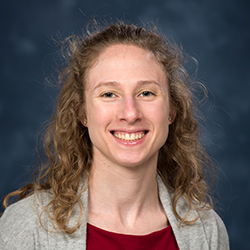Residency: Clinical Pathology
The Resident Training Program in Veterinary Clinical Pathology at NC State is a three-year postgraduate training opportunity designed to provide advanced training in veterinary clinical pathology, to develop diagnostic laboratory skills and to develop teaching and communication skills. Completion of this program will fulfill the prerequisites for the Clinical Pathology Board Certification Examination by the American College of Veterinary Pathologists. This residency program is designed to prepare trainees for the many available career opportunities in veterinary clinical pathology including diagnostic laboratories, academic institutions, toxicologic/ pharmaceutical industries or private businesses.
The program provides ample opportunities to develop proficiency and acquire expertise in advanced clinical pathology necessary to become a Diplomate of the American College of Veterinary Pathologists. Residents will participate with faculty, staff and veterinary students in the daily professional activities, and acquire teaching and writing skills through the combined professional instructional efforts. In addition, residents will have the opportunity to complete externships, a teaching certificate, a research project, participate in seminars, and rotate through other diagnostic and clinical services. For interested students, post-residency opportunities for graduate work are available. Please click here for more information.
NOTE: This residency does NOT participate in the residency matching program VIRMP.
Program
The Clinical Pathology Residency Program provides training primarily in cytology, hematology, hemostasis, clinical chemistry, urinalysis and surgical pathology. Residents will evaluate and diagnose cytologic and surgical pathology material. They will also review and interpret laboratory results from hematology, coagulation, clinical chemistry and urinalysis. Routine laboratory material serves as source material for evaluation.
Similarly, residents are expected to develop proficiency in certain laboratory techniques and will have laboratory and instructional responsibilities. Attendance and participation in various rounds including clinical pathology rounds and case discussions, journal club, histopathology conferences, house officer rounds, internal medicine rounds and teaching certificate are required. Residents are also encouraged to attend seminars, conferences and clinical rounds in the college, university and surrounding area.
Clinical research projects provide opportunities to enhance grantsmanship, organizational, publication and communication skills. Presenting results of these projects at national meetings and publishing in appropriate journals is strongly encouraged.
A multi-institutional annual mock ACVP examination is used as an excellent board preparatory exercise and assessment of progress in the program.
Program Outline
The following is a general outline for the training program. Twice a year the resident and the residency committee meet to develop a 6-month plan for professional activities. The resident is ultimately responsible for compliance with the work plan. During the third year, a component of the trainee’s duty is to mentor junior residents, and assume increased responsibility for cytopathology duty and senior student clinical pathology teaching.
- Orientation on laboratory medicine, specimen preparation and handling, record keeping, teaching resource material and photography.
- Assignment to clinical pathology service duty for approximately 20-24 weeks/year. Duty includes evaluating cytologic samples (both in-house and send-in samples); reviewing blood smears, chemistry data, coagulation data, and urinalysis data; and consulting with clinicians, students and researchers about the interpretation of laboratory results.
- Rotation (2-4 weeks) in the clinical pathology laboratory to gain proficiency in operating laboratory equipment and learning test methodologies, quality control and laboratory management.
- Gain teaching experience through presentation of lectures and assisting in laboratory instruction in the sophomore clinical pathology course and senior clinical pathology rotations.
- Presentation of 1-2 seminars in the House Officers’ Seminar Series. Weekly attendance of this seminar series is required.
- Attend, participate, and present at scheduled required rounds sessions.
- Participate in a research project/ experience and submit 2 first author publications.
- Encourage presentation of case material and/or research project at regional or national meetings.
- Other opportunities include rotations of 1-2 week duration through ancillary disciplines such as anatomical pathology, Rollins State Diagnostic Laboratory, a basic research laboratory, the clinical immunology laboratory, and clinical services. All residents rotate with Antech Diagnostics clinical pathologists.
- Flex time is worked into program outline for externships, workshops, additional boards studying, and to allow for extra time to be devoted to main area of interest.
Facilities and Faculty
The NC State Veterinary Hospital receives about 34,000 patients annually including increasing numbers of avian, fish and exotic species. The Clinical Pathology Laboratory handles a monthly workload of approximately 5000 accessions.
For an overview of the clinical pathology lab, staff, and faculty please see the clinical pathology website.
Mentorship
Clinical pathology residents have a three-member residency advisory committee. Residents meet with their committee at least biannually for career and residency guidance and to evaluate performance and progress in board preparation.
Funding
We provide funding for conference travel, externships, further case work-up, and small projects.
Graduate Training
Please go to the Comparative Biomedical Sciences homepage for more information.
Leadership and Faculty
Apply
The following link is for the reference form which will be in place of traditional letters:
The program is not part of the residency matching program.
Information for International Applicants
Preference is given to applicants who have graduated from a college that is accredited by the American Veterinary Medical Association. If you wish to apply for an internship or residency program things to keep in mind:
- Have your degree translated and evaluated by World Education Services (WES). NC State will only accept degree verification from WES as it verifies the degree as well as its equivalency to a U.S. degree.
- Some programs require the TOFEL exam to qualify for an internship or residency position.
- Foreign national interns and residents are appointed to H-1B visas.
- To ensure that a foreign national candidate has the H-1B visa at the start of their program the candidate will be asked to pay for the premium processing filing fee of $1,225 USD.
- Visa processing generally takes between 4 and 6 months however if the visa is expedited it takes approximately 15 business days.
- Take the initial steps and apply for The Educational Commission for Foreign Veterinary Graduates (ECFVG) certification program is accepted by all state veterinary regulatory boards and the federal government as meeting, either in part or full, the educational prerequisite for licensure or certain types of employment, respectively.
Leadership and Faculty
Program Leadership
Faculty
Adjunct Faculty
- Dr. Jan Andrews, DVM, PhD, DACVP
Antech Diagnostics - Dr. Nancy Collicutt, DVM, MS, DACVP
Antech Diagnostics - Dr. Amy DiDomenico, DVM, DACVP
Antech Diagnostics - Dr. Jennifer Neel, DVM, DACVP
Antech Diagnostics - Dr. Valarie Pallatto, DVM, DACVP
Antech Diagnostics - Dr. Cory Sims, DVM, DACVP, CCRP
Charles River Laboratories
Past Residents
- Dr. Elizabeth Held, University of Pennsylvania
- Dr. Ashley Parsley, Zoetis
- Dr. Meagan Wheatley, Antech Diagnostics
- Dr. Jessica Marin Warner, Antech Diagnostics
- Dr. Cory Sims, Charles River Laboratories
Apply
The following link is for the reference form which will be in place of traditional letters:
The program is not part of the residency matching program.
Information for International Applicants
Preference is given to applicants who have graduated from a college that is accredited by the American Veterinary Medical Association. If you wish to apply for an internship or residency program, here are things to keep in mind:
- Have your degree translated and evaluated by a reputable company. If the degree that qualifies the employee for the position is from any institution outside the US, it will need to be evaluated for US equivalency. Options include World Education Services (WES) and the Foundation for International Services (FIS).
- Some programs may require the TOEFL exam to qualify for an internship or residency position.
- Foreign national interns and residents are appointed to H-1B visas.
- To ensure that a foreign national candidate has the H-1B visa at the start of their program the candidate can be asked to pay the premium processing filing fee of $2,805 USD.
- Visa processing generally takes between 4 and 6 months however if the visa is expedited it takes approximately 15 business days.

